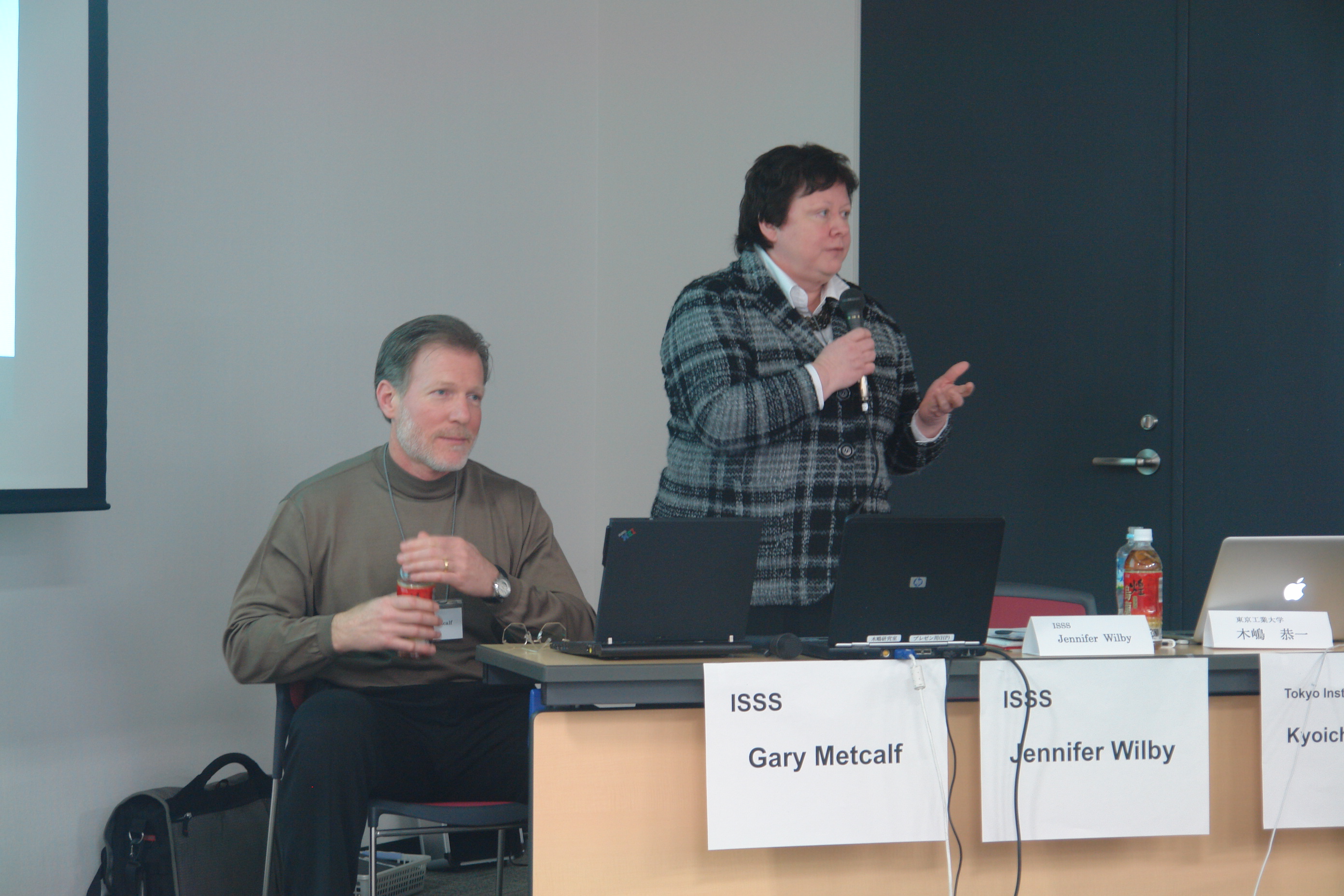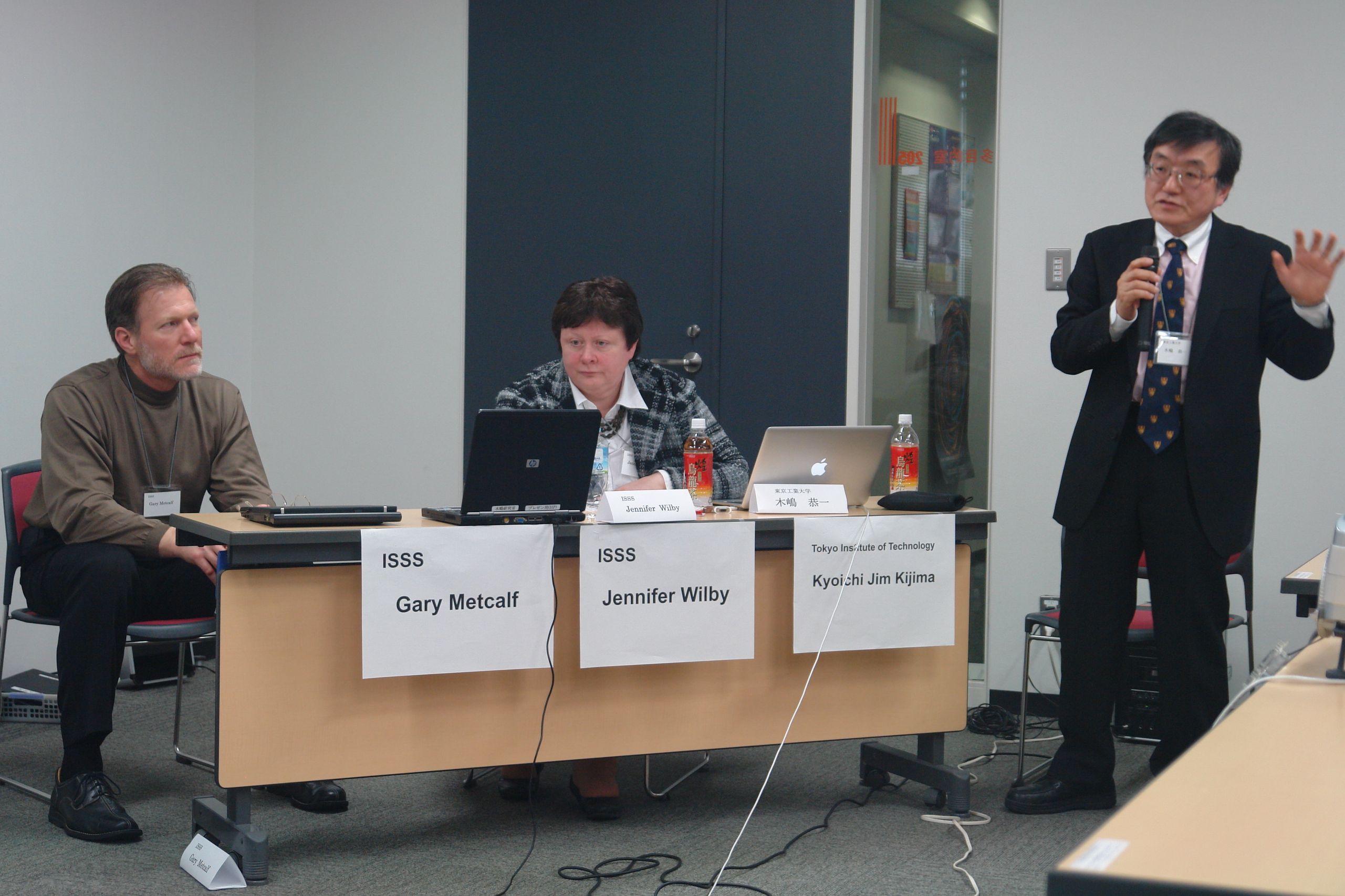Open Seminar on Service Systems Science (2009), Systems Sciences Meet Service Sciences, Service Innovation Educational Program, Tokyo Institute of Technology (Tamachi campus)
This digest was created in real-time during the meeting, based on the speaker's presentation(s) and comments from the audience. The content should not be viewed as an official transcript of the meeting, but only as an interpretation by a single individual. Lapses, grammatical errors, and typing mistakes may not have been corrected. Questions about content should be directed to the originator. The digest has been made available for purposes of scholarship, posted on the Coevolving Innovation web site by David Ing.
Introduction by Kyoichi Jim Kijima
[Kyoichi Jim Kijima]
Agenda
- Service Innovation Program at Tokyo Tech (that funded this seminar)
- Research program
- Educational program
Service Innovation Program at Tokyo Tech was selected by the govenment starting October 2007
Social needs:
- 70% of Japanese GDP from service sectors
- Aging society with fewer children
- Outsourcing and hollowing out
Tokyo Tech is a leading science university
Service means not just narrow sense of business
- Social value
- Service system, as in the Cambridge White Paper
Service as co-experienced, co-produced and shared between providers and suppliers
Research in 4 parts
- Understand service system
- Design desirable service system
- Propose desirable service system
- Evaluate system
3 research domains
- Basic value of social infrastructure
- Innovative service business of business
- Sustainability of global community
Service System Science as an advanced liberal art
Gary Metcalf, The Essence of Service
![20090225 ServSysSci Gary S. Metcalf] 20090225 ServSysSci Gary S. Metcalf](/commons/user/pages/133.digests/25.20090225-1515-titech-sss-panel/DI_20090225_003030_ServSysSci_GM.jpg)
Buying a car versus renting a car is accounted differently on GDP
- The car runs the same every way, not so different for end customers
Quality?
As end customer, looking for utility
- Evaluate tradeoffs: if cheap then don't expect much
Doctors get paid for doing procedures
Difficulty: if going to make a science of service, what are we working on?
If no distinction between product and service, need to decide everything is a product or everything is a service
Service as filling the gap between what I purchase, and the feeling of utility
The gap may work at an individual level, but may not work at a societal level
9 types of Living Systems, James Grier Miller
- Cell, organ, organism, ... supranational system
- Energy works at all levels, as does information
- Language from organism up
- Economy, from group up
- Technology, from organism up
- So where does service fall? Is it natural, or is it only human?
Jennifer Wilby, Systems and Services Sciences

At University of Hull, have 6 research centres
All based on cross-disciplinary theory and methods
Like the T-shaped metaphor
Centre for Systems Studies across, each are deep:
- Systems studies has its own body of knowledge, but also the interdisciplinary link between
- Managemnet and organization learning
- Logistics
- Marketing
- Accounting and finance
- Economics
Want to develop a social value architect
Need to look at inter-personal and individual characteristics o the service system
Issues of implementatoin, implying choices for boundary decisions, scale, measurement, models, methodologies and theories chosen in practice
Hiroshi Deguchi, Hyper Variety Service market and its Platform Infrastructure Design
(DI_20090225_010630_ServSysSci_HD_MK_KPF.jpg "20090225 ServSysSci HHiroshi Deguchi, Marianne Kosits, Klaus-Peter Faunrich")
Platform, e.g. operating system for application software
Vertical integration: has lock-in
Content service domain: no lock-in
Global manga cocreation
Compare Woodstock with comic markets
Hyper variety vs. universal service
Panel discussion

Experience engineering
Stewardship of others' resources, may be part of the social contract
In a world of financial crises, service systems need to reflect the social elements now in systems science
Helping people figure out what they need could be part of the service
Asked by NSF about service science to K-12
What is the phenomenon in the world, and how do you teach it?
Service science research dependent on economic situation
Creative class
Accounting for inputs rather than outputs
Value accounting, required restructuring of bookkeeping
New advanced liberal arts

This work is licensed under a Creative Commons Attribution-NonCommercial-ShareAlike 4.0 International License